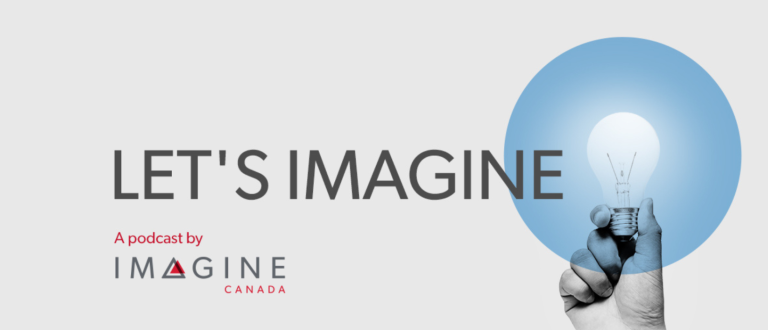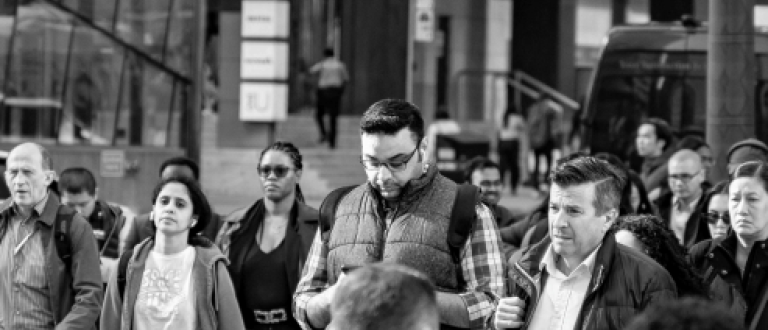An update from Imagine Canada on anti-racism and anti-oppression
On June 12, 2020, in reaction to the global movement for racial justice spurred by the murder of George Floyd and others killed by acts of anti-Black racism, we wrote in a statement, that we had “a lot of work to do to ensure our programs, processes, and work culture are truly equitable—work that won’t happen overnight. We are committed to doing more than just sharing words. (...) We will accelerate our journey and we will be updating you on our progress.”
More than two years since publishing this statement, a lot has happened, yet, we still have so much to do and learn. Today, we wanted to share an update on how we are working to advance anti-racism and anti-oppression (ARAO) at Imagine Canada.
How we got started
Our ARAO journey began when we engaged a culture change and social impact consultant with an expertise in anti-racism to help us take a look at our internal and external practices and embark on a long overdue organizational change process grounded in anti-racism and anti-oppression. This was the beginning of a profound DNA change for Imagine Canada, meant to rewire our organization to engrain anti-racist approaches into every element of our work.
Over these past two years, we have been working to change our culture, mindset and processes. Working with a consultant was key to get us started; she created a detailed roadmap which has been guiding our efforts since. Many of the items in this article stem from this work, and we are dedicated to its ongoing implementation and evolution. Our roadmap includes numerous recommendations, related to various areas of our work and organization. To help us prioritize which recommendations would be activated first, two staff members took lead roles to help coordinate and guide the implementation of the roadmap. They first consulted with all of our department teams. During this process, each team also identified a person responsible for reporting on their progress.
Just like anything else that’s important, we know that ARAO work needs to be tracked, properly resourced, and grounded in accountability. We have created a tracking system for ARAO, with directly responsible leads for each item, to ensure that this progress is happening, and will continue to be prioritized. Our internal ARAO Working Group, formed at the beginning of the process, is responsible for ensuring that the team leads update our tracker, and for carrying out additional consultations with the staff as needed - for example, if a team isn’t making progress on their group-specific recommendations, or for helping prioritize competing priorities.
Since this roadmap is guiding our strategic direction as an organization, we have updated our Strategic Planning Framework, and included our statement on our commitment to equity, anti-racism and anti-oppression, which was developed jointly by both our board and staff. In addition, we recently completed a Theory of Change. The objective of this work, which included extensive consultations with a vast variety of stakeholders, was to identify priority areas for Imagine Canada to focus on. Equity and social justice were central themes that kept emerging during the consultations. This only reaffirmed our commitment to advancing equity and anti-racism within our organization, the sector and our communities.
Embedding ARAO into our human resources practices
A key element of our ARAO journey internally at Imagine has been to create safe, intentional spaces to discuss racism and oppression. Every month or so, our staff meet to discuss a book that we selected as a group. Members of our anti-racism book club are finding the exercise incredibly valuable and eye-opening. Staff also take part in training sessions on various ARAO topics, from deepening our understanding of land acknowledgement practices and 2SLGBTQ inclusion to intersectionality.
Another crucial piece of our ARAO work is the evolution in our hiring and advancement processes. To be fully transparent, this has been a challenge for us, but we’re making progress. For example, in order to build a more diverse staff, we changed our process for all job openings, where these opportunities must now be advertised externally. In terms of the challenges we’ve encountered and are still working to address, one example is the process for candidates to submit applications. In order to remove unconscious biases, we are exploring ways to anonymize resumes. Right now, candidates submit their applications via email, and anonymizing resumes can only be done manually. For any job opening that we advertise, we receive quite a high volume of resumes, which makes this task extremely labour intensive. As such, we’re exploring new application submission avenues where we can filter to omit certain identifying information, which can be retrieved later in the process. This requires research and investigation that we don't have the capacity for right now. Engaging an external expert and hiring staff that can dedicate more time to this is also a financial barrier. We are, however, determined to find a viable solution (suggestions are welcome!).
In all job postings, we explicitly encourage individuals from diverse backgrounds to apply. We are also making efforts to diversify where we advertise our job postings in order to reach individuals outside of mainstream networks, and are mindful to consider the lived experience of applicants. In our job postings, we clearly state salary and benefits. That’s something that we already did before starting on this journey two years ago. But, we took it a step further last year by supporting the #ShowTheSalary campaign, led by FoodShare.
Ensuring our programs and services serve the WHOLE sector
We wanted to highlight a number of external ARAO initiatives that our team has been working on. At Imagine, research is core to our mission, and we are proud that two of our upcoming major projects will focus on ARAO. With the Equity Benchmarking Study, we and our incredible project partners will provide the sector with its first comprehensive snapshot into what charities and nonprofits are doing (or not) to advance equity, anti-racism, and anti-oppression. It is a collective project, and we are grateful to the many organizations and allies that have been leading this project alongside our team. In addition, a forthcoming study on JAIDE (Justice, Access, Inclusion, Diversity, Equity) within the CSR and corporate community investment profession will offer unique insights and recommendations from those traditionally excluded from corporate social impact decision tables on how companies can better advance philanthropy in service of JAIDE.
Equally core to our mission, we focus on advocacy as a vehicle for change for the sector, including by furthering change that will support organizations led by and serving equity-seeking communities. For example, alongside the sector, we advocated to change the income tax act in regards to how charities work with non-charities, as the legislation disproportionately impacts equity-seeking communities. We are also working with the Nonprofit Federal Data Working Group to bring equity considerations to the government’s collection of data on the sector and advocating for reforms to government grants to help improve working conditions for the sector’s diverse workforce.
A new initiative, HR Intervals is a toolkit which offers free, bilingual resources to help nonprofit leaders better understand, address, and guide people management in their organizations. ARAO principles were embedded into this project from the onset. The site includes a section on Equity & Decent Work (we’re grateful to the Ontario Nonprofit Network for their leadership on this), and the content was reviewed from an equity and inclusion lens by an ARAO consultant.
These are some examples of how we’ve been shifting our focus to advance ARAO. A series of other initiatives are highlighted in our 2021 Annual Report, which we invite you to peruse.
Our journey continues
An ARAO journey does not end, as it must be woven throughout every fiber of an organization. And so this process has been ongoing and co-led by our board and staff working in tandem. We must stress that this is not just a staff-led initiative, as the leadership of our board has been tremendously important. We have an anti-racism working group on our board, which has been a key part of driving this work forward. Over the past two years, our board has also become more reflective of the sector.
We hope this update provides insights into our ARAO commitment, work, and progress. One of our commitments moving forward is to share updates about our journey more frequently, including our challenges and learnings.
We invite you to reach out to us if you have any comments or questions about this update or our work, or if there are learnings from your own ARAO journey that you’d like to share with us.
We are grateful to you, our stakeholders, for challenging us to think differently and use our position of privilege and power to advance equity and justice within our sector and society as a whole. We remain accountable to you.


